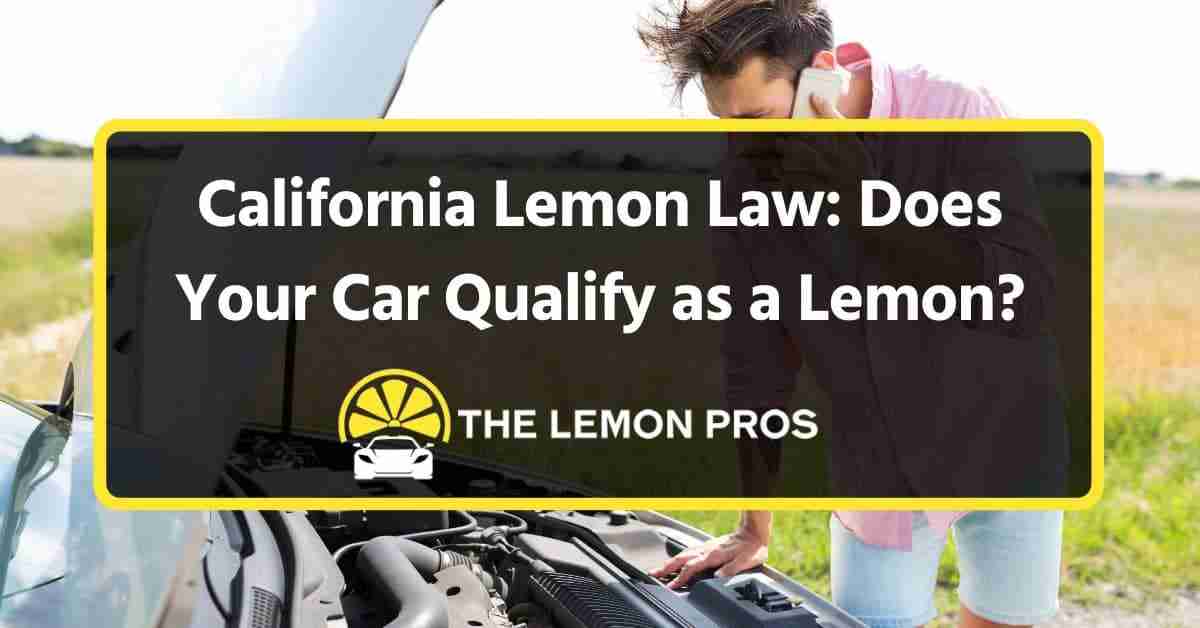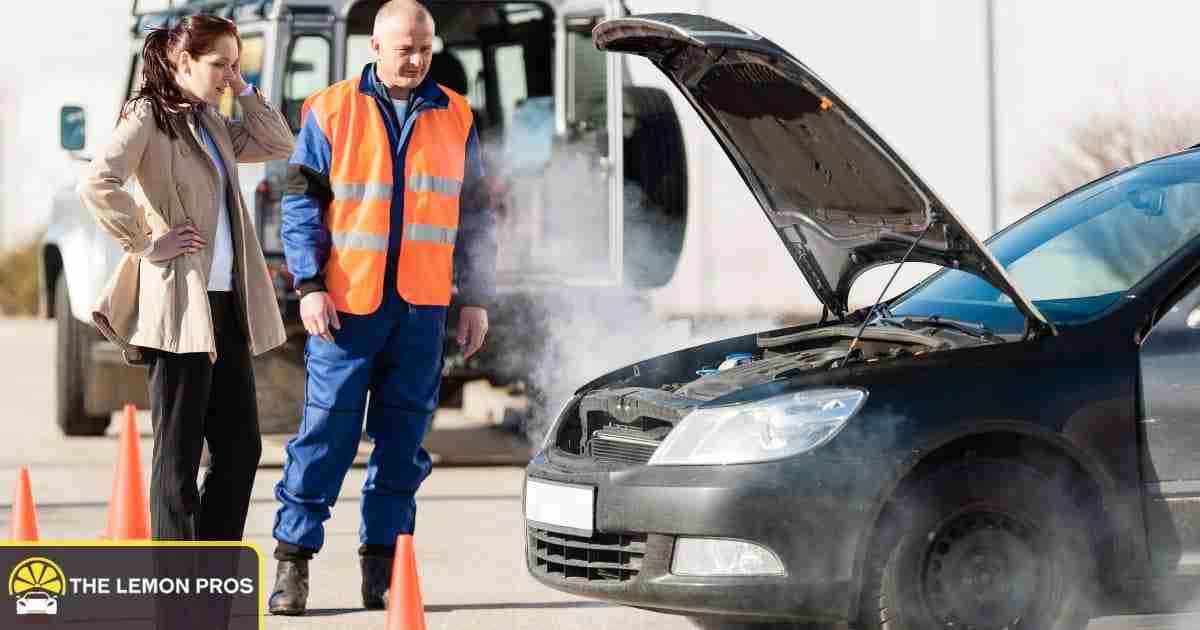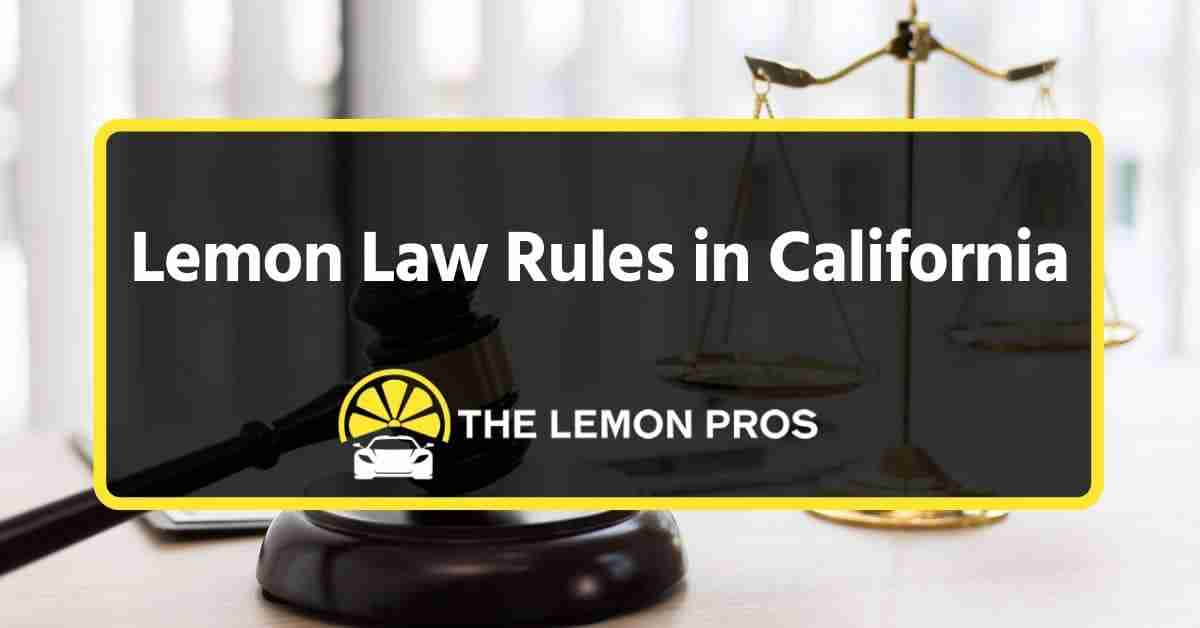
California Lemon Law: Does Your Car Qualify as a Lemon?
If your vehicle has been experiencing consistent issues after a reasonable number of repair attempts, it may be considered a lemon. Thankfully, the California Lemon Law protects drivers who purchase or lease a new or used vehicle with recurring defects while it is still under warranty. The laws were designed to help you get the compensation you deserve when you purchase or lease from a licensed manufacturer or dealer.
To maximize Lemon Law compensation, you need to understand your rights as a consumer under this law and the right steps to take to get compensated, and consulting with a California Lemon Law lawyer can make the process smoother and less stressful for you.
Our experienced California Lemon Law attorneys at The Lemon Pros have helped over 5000 consumers get the compensation they deserve for their lemon vehicles. Our team can help you understand your options, handle the legal paperwork, and talk to the car manufacturer on your behalf. This can increase your chances of getting a favorable outcome, whether that’s getting your money back or getting a new car, we can negotiate a favorable settlement for you. Book a free consultation with us today for a free case review.
This blog will help you understand how the Lemon Law works in California, what makes your car qualify as a lemon, as well as our tips for dealing with a lemon vehicle.
Table Of Contents
- What Is the California Lemon Law?
- How to Find Out if Your Car Is a Lemon?
- Types of Defects Covered Under California State Lemon Law
- How Long Do I Have To File a Lawsuit Under California Lemon Law?
- Can I Return a Car I Just Bought in California?
- How to File a Lemon Law Claim in California?
- Lemon Law California New Car Guide: Know Your Rights
- Get the Compensation You Deserve
- FAQ
- What Are the Lemon Law California Requirements?
- What Remedies Does the California Lemon Law Provide?
- What Are Some Recent Changes in the California Lemon Law?
- Does Lemon Law Cover Used Cars?
- How Long Does the Lemon Law Process Take?
- Are Lemon Law Settlements Taxable in California?
- Can I Get a Replacement Vehicle for a Certified Pre-Owned Lemon?
What Is the California Lemon Law?

Lemon Law, officially known as the Song-Beverly Consumer Warranty Act, protects consumers who purchase or lease vehicles that turn out to be defective. The law provides remedies to consumers for vehicles that repeatedly fail to meet certain standards of quality and performance. In California, the Song-Beverly Consumer Warranty is supplemented by the Tanner Consumer Protection Act (California Civil Code Section 1793.22).
California Lemon Law covers new vehicles purchased or leased in California that come with the manufacturer’s new vehicle warranty. This includes cars, trucks, boats, SUVs, motorcycles, chassis, chassis cabs, drive trains of a motor home, dealer-owned vehicles, and demonstrators. It also covers used vehicles if they are still under the manufacturer’s original warranty.
How Does California Lemon Law Work?
If California Lemon Law applies to your situation, you may be due a replacement vehicle or a buyback. The first step? Let an attorney determine if the defects are covered by state and federal law. To start a Lemon Law claim, a demand letter needs to be sent to the automobile manufacturer or dealer. Hopefully, the case can be settled out of court, with the help of an arbitration board. However, if the case does need to go to court, you will have the representation needed when using a Lemon Law attorney.
How to Find Out if Your Car Is a Lemon?

For a car to qualify for Lemon Law in California, it must have a defect that significantly affects its use, value, or safety. Lemon Law allows vehicle manufacturers a reasonable number of attempts to repair the vehicle. While the number of repair attempts that is “reasonable” is not strictly defined, California Lemon Law presumes that a vehicle is a lemon if, within 18 months of delivery or 18,000 miles on the odometer (whichever occurs first), any of the following occurs:
- The manufacturer has made two or more attempts to repair a warranty problem that could cause death or serious injury.
- The manufacturer has made four or more attempts to repair the same warranty problem.
- The motor vehicle has been out of service for more than 30 calendar days while being repaired for any number of warranty problems. The 30 days don't have to be consecutive.
If a vehicle is confirmed to be a lemon, the consumer may receive cash compensation, a replacement vehicle, or a refund. The refund includes the purchase price or lease payments made, minus a deduction for the consumer’s use of the vehicle before the first repair attempt for the defect. The manufacturer is required to either replace the vehicle with a new one that is substantially identical or buy back the vehicle (refund the purchase price).
When dealers buy back motor vehicles that are lemons and then sell them again, they must label them as “Lemon Law buyback” and put a “lemon” sticker on the door.
What Qualifies as a Repair Attempt Under California Lemon Law?
Under California’s Lemon Law, a “repair attempt” usually just means any time you’ve taken your car to a dealership or authorized shop to fix a problem that’s covered under warranty.
To qualify as a repair attempt under the Lemon Law:
- The dealership or authorized repair facility must document the repair attempt, providing a repair order or service invoice that details the visit date, the consumer’s reported issue, and the actions taken to diagnose or repair the problem.
- The issue must be covered by the manufacturer’s warranty. Non-warranty issues don’t count towards a Lemon Law claim.
- The vehicle must be taken to an authorized place for repair, allowing the manufacturer a chance to fix the issue as per warranty procedures.
- The issue should significantly affect the vehicle’s use, value, or safety. Minor problems might not qualify.
- There should be a reasonable number of attempts to fix the same problem. What’s reasonable varies, but often includes at least two tries for serious safety issues or four for other defects.
Types of Defects Covered Under California State Lemon Law

California Lemon Law covers a wide range of vehicle defects, but with a focus on issues that substantially impair the vehicle’s use, value, or safety.
Defects that impair use are issues that hinder the vehicle’s ability to perform its primary function as safe and reliable transportation.
Defects that impair value diminish the overall value of the defective vehicles. Even if the car is drivable, such issues can significantly reduce its market value.
Defects that impair safety include problems that compromise the vehicle’s safety in a significant way. Even a single defect that poses a serious safety risk can be enough to make a vehicle a lemon if it cannot be fixed promptly and effectively.
Note that the defect must be covered under the manufacturer’s warranty to qualify, and minor problems, such as normal wear and tear, do not qualify under the Lemon Law.
There also must have been an attempt to be repaired by an authorized dealer or repair service a reasonable number of times. Typically, this means at least two attempts for serious safety issues or four attempts for other significant defects. Moreover, it must occur within a certain timeframe from the vehicle’s purchase, usually within the warranty period or a specified number of miles.
The defect should not be due to abuse, neglect, or unauthorized modifications by the consumer. The vehicle must have been used and maintained according to the manufacturer’s recommendations. California Lemon Law also does not cover vehicles that are not registered under the California Vehicle Code, such as off-road vehicles.
10 Examples of Defects Covered Under California Lemon Law

- Engine Problems: This includes issues that affect the vehicle’s performance, such as engine failure, loss of power, overheating, and problems with starting the vehicle.
- Transmission Issues: Problems with automatic or manual transmissions, such as slipping, difficulty shifting gears, and complete transmission failure.
- Electrical Systems: Defects in the vehicle’s electrical system, including issues with the battery, alternator, computer systems, lighting, and electrical components that affect the vehicle’s operation.
- Steering and Suspension: Problems that affect the vehicle’s steering or suspension, leading to poor handling, unusual noises, or a rough ride.
- Brakes: Issues with braking performance, including brake failure, vibration during braking, and persistent squeaking or grinding noises.
- Safety Systems: Defects in safety systems like airbags, seat belts, and electronic stability controls that could compromise the vehicle’s safety.
- Leaks and Fluid Issues: Significant leaks and problems with fluid systems, such as oil leaks, coolant leaks, and issues with the fuel system.
- Heating and Cooling: Problems with the vehicle’s HVAC system that affect the comfort and usability of the vehicle, including the inability to heat or cool the interior.
- Paint and Body: Substantial defects in the vehicle’s paint or body that were not caused by an accident and that affect the vehicle’s value or integrity.
- Noise and Vibration: Unusual and persistent noises or vibrations that are not normal for the vehicle and affect its use or value.
How Long Do I Have To File a Lawsuit Under California Lemon Law?

In California, consumers have a specific timeframe within which they must file a lawsuit if they believe their vehicle qualifies as a lemon. This timeframe is known as the statute of limitations.
Under the Lemon Law rules in California, the Lemon Law time limit for filing a claim is four years from the date the consumer first realized (or should have realized) that their vehicle was a lemon. The four-year period for Lemon Law claims doesn’t always start on the vehicle’s purchase or lease date. Rather, it begins when you first notice or should notice a consistent defect. This could mean the time starts counting with the first repair effort or when it’s clear the issue can’t be fixed.
Since the start date can vary and is open to interpretation, it’s important to act quickly if you think your vehicle is a lemon. Delaying legal advice or filing a claim might mean missing out on Lemon Law protections.
Once you suspect that your vehicle may qualify under the Lemon Law, consider consulting with an experienced California Lemon Law attorney. Our Lemon Law lawyers at The Lemon Pros can provide you with guidance on how to proceed, help you understand your rights and the specifics of the law, and ensure that any legal action is taken within the appropriate timelines.
Start by booking a free consultation with us today to confirm whether or not your new or used vehicle qualifies as a lemon.
Can I Return a Car I Just Bought in California?
What should you do if you bought a car in California, and can you really return it? The simple answer is, it depends. Unfortunately, the answer isn't that cut and dry.
In California, there isn’t a general “cooling-off” period that allows you to return a car simply because you’ve changed your mind after purchase. This means that once you’ve signed the contract and bought the car, the vehicle is yours, and the sale is considered final. However, there are some specific circumstances where you might be permitted to return the car.
First, you might be able to return your new motor vehicle if you can prove that it is a lemon. Secondly, some dealers may offer a contract cancellation option for used cars that must be purchased at the time of sale. The option typically allows you to return the vehicle within a short period for any reason. However, there may be restrictions based on the mileage driven after the sale and a restocking fee.
Also, if the sale involved fraudulent practices or significant misrepresentation of the vehicle’s condition, you might have legal grounds to return the car or seek compensation. If your car is subject to a recall or is a manufacturer buyback (also known as a Lemon Law buyback), you might have additional rights.
If you find yourself in a situation where you need to return a vehicle shortly after purchase, it’s advisable to review your contract and speak with the dealership directly.
How to File a Lemon Law Claim in California?

Filing a Lemon Law claim and starting a Lemon Law case in California involves several steps aimed at either getting the manufacturer to replace the defective vehicle or refund the purchase. Here’s a step-by-step guide to guide you through the process:
1. Gather Documentation
Start by collecting all relevant documentation related to your vehicle and the issues it has experienced. Required documents may include purchase or lease agreement, warranty information, all service orders, and repair records showing the dates your vehicle was in the shop and the repairs attempted, and any correspondence with the manufacturer or dealer regarding the vehicle’s issues.
2. Attempt to Resolve the Issue With the Manufacturer
Before filing a claim, you must give the manufacturer a reasonable number of repair attempts to fix the vehicle. Take your vehicle to an authorized dealership or repair facility for repairs. Keep all records of repair attempts, including dates, descriptions of the problems, and the dealer’s response.
3. Send a Formal Notification
If the manufacturer cannot fix the vehicle after a reasonable number of repair attempts, send them a formal, written notification of the problems and your request for a refund or a replacement vehicle. Use certified mail for this communication to ensure you have a record of it being sent and received. Provide all the collected documentation to support your claim. California law encourages, but does not require, consumers to use the manufacturer’s arbitration program before going to court.
4. Consult a Lemon Law Attorney
Consider consulting with an attorney who specializes in Lemon Law. Many attorneys offer free consultations and work on a contingency fee basis, meaning they don’t get paid unless you win your case.
5. Prepare Your Claim
If you decide to start a Lemon Law claim, your attorney will help you prepare your case. We organize your evidence, detail the vehicle’s issues, and demonstrate how the situation meets the criteria under California Lemon Law.
6. Consider Arbitration or Legal Action
Some manufacturers offer an arbitration process as an alternative to court, which can be quicker and less expensive. However, you’re not bound to accept the arbitrator’s decision if it’s not favorable to you. If arbitration is not successful or is not chosen, your next step would be to file a lawsuit in court.
7. Court Proceedings
If your Lemon Law case goes to court, be prepared for a process that can take several months or even longer. During this time, your attorney will present your case, and the manufacturer will have an opportunity to respond. The outcome will depend on the strength of your evidence and the nature of your situation.
8. Resolution
A Lemon Law claim can be resolved through a settlement or court judgment. Throughout this process, maintaining detailed records and clear communication is crucial. The entire Lemon Law process usually takes between 3 to 6 months, and the resolution may include the manufacturer offering to buy back the vehicle, replace it with a comparable model, or, less commonly, compensate you in some other way. For example, if you bought a 2020 SUV that turned out to be a lemon, the manufacturer could replace it with another 2020 SUV.
On the other hand, if you are eligible for a Lemon Law buyback, you can use our handy Lemon Law buyback calculator to estimate the amount you might be owed. It's very user-friendly and gives you some quick ballpark figures.
When it comes to settlement, the average Lemon Law settlement in California tends to fall anywhere between $5,000 and $100,000, as each case is unique and it’s difficult to give a precise average.
Lemon Law California New Car Guide: Know Your Rights

Dealing with a lemon vehicle can be frustrating, but taking the right steps can significantly improve your chances of resolving the issue effectively. Here are 7 expert tips to help you.
- Keep Detailed Records: Start keeping detailed records of all repairs, receipts, and interactions regarding the vehicle’s issues. Ensure repair documents clearly state the reported problem and the actions taken.
- Follow the Warranty Process: Always use authorized dealers or repair shops for repairs as prescribed by the warranty. Unauthorized repairs might nullify Lemon Law protections.
- Be Persistent: Return the vehicle for further repairs if the issue persists. Lemon Law requires a reasonable number of repair attempts to resolve the problem.
- Communicate Clearly and Keep Everything in Writing: Be clear about the issues when talking to the dealership or manufacturer. Follow up verbal communications with a written summary.
- Understand Your Rights: Learn about your state’s Lemon Law and your rights. This knowledge helps in effectively navigating the process.
- Use Certified Mail for Important Correspondence: Send formal complaints and legal notices via certified mail. This provides proof of your communication.
- Consult a Lemon Law Attorney: Take the time to find an expert California lemon attorney, who will provide you with valuable advice. Many offer free consultations and work on a contingency basis.
Get the Compensation You Deserve
As long as you qualify, California Lemon Law helps you get a befitting compensation when you purchase or lease a defective vehicle. However, you need a proper understanding of the law, its requirements, and its process to get maximum compensation. And that’s where The Lemon Pros come in. Our experienced Lemon Law attorneys are always available to help you file and win a successful Lemon Law claim. Book a free appointment with us today for a free case review.
FAQ
What Are the Lemon Law California Requirements?
California Lemon Law covers new vehicles that have a major defect substantially impairing its use, value or safety. The defect must first occur within 18,000 miles or 18 months, whichever comes first. You must have also allowed for a reasonable number of repair attempts, typically between two and four, depending on the severity of the problem.
What Remedies Does the California Lemon Law Provide?
You may be offered a Lemon Law buyback, which permits you to return the vehicle for a refund. There's also the option to choose a replacement vehicle that matches your current model, but without the defects. If the problems aren't severe, you may prefer the cash-and-keep settlement agreement instead.
What Are Some Recent Changes in the California Lemon Law?
California has made some changes to the Lemon Law rules recently, but mainly when it comes to used cars. All used cars must now be covered under the manufacturer's warranty or they may not qualify for Lemon Law protection.
Does Lemon Law Cover Used Cars?
Yes! There's a Lemon Law for used cars, but the vehicle must be purchased from a licensed dealership and must have the manufacturer's warranty. Even if the used car doesn't qualify for Lemon Law, there are still other reasons to sue a car dealership, especially if there's been fraud or negligence.
How Long Does the Lemon Law Process Take?
The entire Lemon Law process can take several months to a year, depending on the complexity of your case. The driver with clear vehicle defects that make it impossible to operate the car is going to receive a faster settlement offer than another with only a minor inconvenience.
Are Lemon Law Settlements Taxable in California?
In California, Lemon Law settlements are generally considered tax-free, as they typically compensate you for a defective vehicle you’ve already paid for. Since you’re receiving money back rather than income, most of these settlements are not taxable. However, exceptions exist. If your settlement includes punitive damages, interest payments, or compensation for emotional distress, those amounts may be considered taxable income. Given these nuances, it’s advisable to consult a tax professional to understand how your specific settlement might affect your tax obligations, especially concerning any legal fees that could be deductible.
Can I Get a Replacement Vehicle for a Certified Pre-Owned Lemon?
Certified Pre-Owned (CPO) vehicles are covered by California’s Lemon Law protections, provided they come with a manufacturer’s warranty. To be sure your vehicle qualifies, have a free consultation with an expert Lemon Law attorney.






